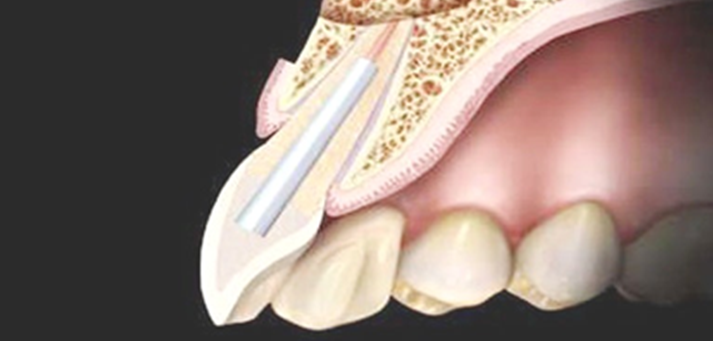Endodontic Surgery
E
n
d
o
d
o
n
t
i
c
S
u
r
g
e
r
y
Surgery can help save your tooth in a variety of situations:
• If you have persistent symptoms but no problems appear on your x-ray, your tooth may have a tiny fracture or canal that could not be detected during nonsurgical treatment. In such a case, surgery allows your endodontist to examine the root of your tooth, find the problem, and provide treatment.
• Sometimes calcium deposits make a canal too narrow for the cleaning and shaping instruments used in nonsurgical root canal treatment to reach the end of your root. If your tooth has this “calcification,” your endodontist may perform endodontic surgery to clean and seal the remainder of the canal.
• Surgery may also be performed to treat damaged root surfaces or surrounding bone.
Although there are many surgical procedures that can be performed to save a tooth, the most common is called apicoectomy or root-end resection. When inflammation or infection persists in the bony area around the end of your tooth after a root canal procedure, your endodontist may have to perform an apicoectomy
Surgery can help save your tooth in a variety of situations:
• If you have persistent symptoms but no problems appear on your x-ray, your tooth may have a tiny fracture or canal that could not be detected during nonsurgical treatment. In such a case, surgery allows your endodontist to examine the root of your tooth, find the problem, and provide treatment.
• Sometimes calcium deposits make a canal too narrow for the cleaning and shaping instruments used in nonsurgical root canal treatment to reach the end of your root. If your tooth has this “calcification,” your endodontist may perform endodontic surgery to clean and seal the remainder of the canal.
• Surgery may also be performed to treat damaged root surfaces or surrounding bone.
Although there are many surgical procedures that can be performed to save a tooth, the most common is called apicoectomy or root-end resection. When inflammation or infection persists in the bony area around the end of your tooth after a root canal procedure, your endodontist may have to perform an apicoectomy
From our Cases
F
r
o
m
o
u
r
C
a
s
e
s

Case 1
C
a
s
e
1
Case 1: Tooth #21 has to be maintained in the mouth for a prosthetic purpose. A previous failure in the root canal treatment, with the presence of a vestibular fistula indicated an active apical infection. Due to the presence of a metal post and the short length of the root, an apicectomy is indicated to save the situation.

Case 2
C
a
s
e
2
Case 2: A 37 years old woman was referred to ProSmile for a crown lengthening for her anterior maxillary teeth, so that her practician can change all her old caramo-metallic crowns. Her maxillary lateral left incisor still presents a fistulae in the apical region despite the appropriate canal treatement. An endodontic surgery will be the treatememt of choice to save the situation. Treatment done by Dr Walid Kattar.


